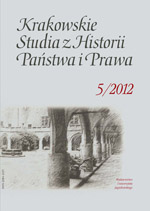Artykuł recenzyjny monografii Macieja Mycielskiego, Rząd Królestwa Polskiego wobec sejmików i zgromadzeń gminnych 1815–183
The review of Maciej Mycielski’s monograph: The position adopted by the government of the Kingdom of Poland toward the Seymik’s and the Commune’s...
Author(s): Paweł CichońSubject(s): Law, Constitution, Jurisprudence
Published by: Wydawnictwo Uniwersytetu Jagiellońskiego
Keywords: municipal assemblies; the history of administration; the Polish Kingdom; the right to vote
Summary/Abstract: The review of Maciej Mycielski’s monograph: The position adopted by the government of the Kingdom of Poland toward the Seymik’s and the Commune’s assemblies, 1815–1830 The monograph produced by M. Mycielski discusses the policy pursued by the government of the Kingdom of Poland toward the Seymiks and commune assemblies and toward the elections to the Chamber of Deputies and the Voivodship Councils that were carried out in the Seymiks and commune assemblies in 1817-1830. The monograph shows the authentic functioning of the electoral assemblies, thereby proving that the Polish nation regarded the State as their own institution and that the electoral assemblies secured the sense of national sovereignty. The first chapter presents the administrative provisions that were of binding force in the 1820s. The chapter discusses also their origin as well as those of their versions that were rejected. It points to the entire bills that never came into force. The next chapter tries to show how numerous the electoral assemblies were. The third chapter, in its turn, analyses the governmental activities in the area of electoral practices and the problems arising from them. In this chapter there were discussed inter alia the right to vote, the method of proposing the candidates, casting and counting the votes, locations for holdingg the electoral assemblies, organizing feasts, drawing up the lists of candidates for the respective posts, and also nullifying the incorrectly held Seymiks and electoral assemblies. The fourth chapter was designed to characterize the direct involvement of the authorities in the electoral struggle. The latter tended toward eliminating the candidates of the opposition and promoting those that were supported by the authorities, the candidates for the members of the House of Deputies and those for the Voivodship Councils being at stake. The author of the monograph tried also to demonstrate the effectiveness of the described activities and show the causes of success or failure of administration in this area.
Journal: Krakowskie Studia z Historii Państwa i Prawa
- Issue Year: 5/2012
- Issue No: 2
- Page Range: 209-222
- Page Count: 14
- Language: Polish

